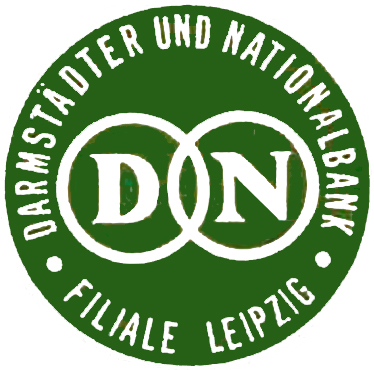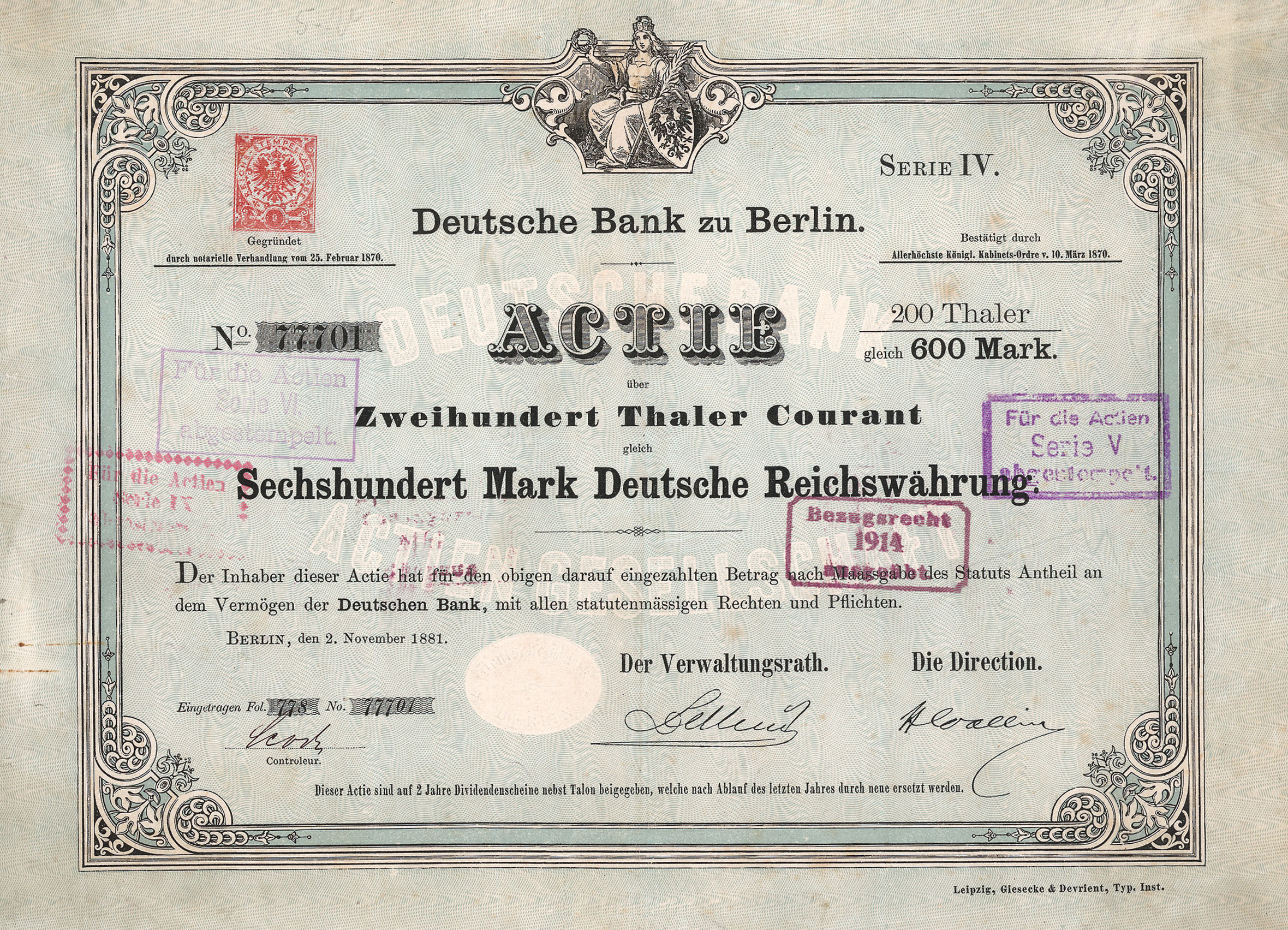|
Darmstädter Und Nationalbank
The ''Darmstädter und Nationalbank'', in shorthand Danat-Bank or Danatbank, was a large German joint-stock bank. It was formed in 1922 from the merger of the Bank für Handel und Industrie (Darmstadt), known as Darmstädter Bank, and the Nationalbank für Deutschland. Its failure in July 1931 was a significant episode of the European banking crisis of 1931. Overview In 1920/1921, the ''Darmstädter Bank für Handel und Industrie'' and the ''Nationalbank für Deutschland'' formed the bank union ''Darmstädter-Nationalbank Berlin''. Both banks assumed a joint guarantee of capital and reserves of over 1 billion marks. The merger was fully completed in 1922, resulting in one of the largest commercial banks in Germany. By 1930, Danat-Bank had become Germany's second-largest joint-stock bank, with total deposits of 2.4 billion Reichsmarks ahead of Dresdner Bank (2.3 billion), Commerz- und Privatbank (1.5 billion), Reichs-Kredit-Gesellschaft (619 million), and Berliner Handels-Ge ... [...More Info...] [...Related Items...] OR: [Wikipedia] [Google] [Baidu] |
Schinkelplatz
Schinkelplatz is a square in Berlin, Germany, named after Karl Friedrich Schinkel. On one side of the square stands the Bauakademie, under wraps waiting to be rebuilt, and on the other, the neo-Gothic Friedrichswerder Church. In front of both buildings, there is a statue of Schinkel. More recent buildings include a block of apartments, offices, shops and restaurants designed by Axel Schultes and Charlotte Frank; Rafael Moneo; and the firm Hemprich Tophof.Richard Holledge (December 3, 2015)Berlin Development Designed to Hold Its Own With History''New York Times''. The square also has statues of Albrecht Thaer and Christian Peter Wilhelm Beuth. See also * Darmstädter Bank * Ministry for Foreign Affairs (East Germany) The Ministry for Foreign Affairs of the German Democratic Republic (, abbreviated ''MfAA'') was a government body of the German Democratic Republic (East Germany) that existed from 1949 to 1990. It had its seat at Schinkelplatz in Berlin-Mitte. ... Refer ... [...More Info...] [...Related Items...] OR: [Wikipedia] [Google] [Baidu] |
Deutsche Bank
Deutsche Bank AG (, ) is a Germany, German multinational Investment banking, investment bank and financial services company headquartered in Frankfurt, Germany, and dual-listed on the Frankfurt Stock Exchange and the New York Stock Exchange. Deutsche Bank was founded in 1870 in Berlin. From 1929 to 1937, following its merger with Disconto-Gesellschaft, it was known as ''Deutsche Bank und Disconto-Gesellschaft'' or DeDi-Bank. Other transformative acquisitions have included those of Mendelssohn & Co. in 1938, Morgan, Grenfell & Company, Morgan Grenfell in 1990, Bankers Trust in 1998, and Deutsche Postbank in 2010. As of 2018, the bank's network spanned 58 countries with a large presence in Europe, the Americas, and Asia. It is a component of the DAX stock market index and is often referred to as the List of banks in Germany, largest German banking institution, with Deutsche Bank holding the majority stake in DWS Group for combined assets of 2.2 trillion euros, rivaling even Spa ... [...More Info...] [...Related Items...] OR: [Wikipedia] [Google] [Baidu] |
Defunct Banks Of Germany
Defunct may refer to: * ''Defunct'' (video game), 2014 * Zombie process or defunct process, in Unix-like operating systems See also * * :Former entities * End-of-life product In Industry (economics), industry, product lifecycle management (PLM) is the process of managing the entire lifecycle of a product from its inception through the Product engineering, engineering, Product design, design, and Manufacturing, ma ... * Obsolescence {{Disambiguation ... [...More Info...] [...Related Items...] OR: [Wikipedia] [Google] [Baidu] |
1931 Disestablishments In Germany
Events January * January 2 – South Dakota native Ernest Lawrence invents the cyclotron, used to accelerate particles to study nuclear physics. * January 4 – German pilot Elly Beinhorn begins her flight to Africa. * January 22 – Sir Isaac Isaacs is sworn in as the first Australian-born Governor-General of Australia. * January 25 – Mohandas Gandhi is again released from imprisonment in India. * January 27 – Pierre Laval forms a government in France. * January 30 – Charlie Chaplin comedy drama film ''City Lights'' receives its public premiere at the Los Angeles Theater with Albert Einstein as guest of honor. Contrary to the current trend in cinema, it is a silent film, but with a score by Chaplin. Critically and commercially successful from the start, it will place consistently in lists of films considered the best of all time. February * February 4 – Soviet leader Joseph Stalin gives a speech calling for rapid industrialization, arguing that only strong indus ... [...More Info...] [...Related Items...] OR: [Wikipedia] [Google] [Baidu] |
Richard Witting
Richard Witting (born: Witkowski; 19 October 1856, Berlin – 22 December 1923, Berlin) was a Prussian politician and financier. Witting studied law at Göttingen, where he became member of Burschenschaft Hannovera (fraternity),:de:Burschenschaft Hannovera Göttingen and later became mayor of Poznań in 1891–1902. From 1902 to 1910 he was director of Nationalbank für Deutschland. Witting was a brother of Maximilian Harden and father-in-law of Hans Paasche. Witting is considered one of the major authors (''fathers'') of the democratic Weimar Constitution, which he and Hugo Preuß worked out in first drafts. He was also a convert to Lutheran Protestantism from Judaism, a common practice of this epoch. References * Witold Jakóbczyk, ''Przetrwać na Wartą 1815-1914'', ''Dzieje narodu i państwa polskiego'', vol. III-55, Krajowa Agencja Wydawnicza, Warszawa 1989 * Joachim Bergmann: Die Schaubühne – Die Weltbühne 1905–1933, Bibliographie und Register mit Annotationen. Saur ... [...More Info...] [...Related Items...] OR: [Wikipedia] [Google] [Baidu] |
Georg Von Simson
{{disambiguation ...
Georg may refer to: * ''Georg'' (film), 1997 *Georg (musical), Estonian musical * Georg (given name) * Georg (surname) * , a Kriegsmarine coastal tanker * Spiders Georg, an Internet meme See also * George (other) George may refer to: Names * George (given name) * George (surname) People * George (singer), American-Canadian singer George Nozuka, known by the mononym George * George Papagheorghe, also known as Jorge / GEØRGE * George, stage name of Gior ... [...More Info...] [...Related Items...] OR: [Wikipedia] [Google] [Baidu] |
Hjalmar Schacht
Horace Greeley Hjalmar Schacht (); 22 January 1877 – 3 June 1970) was a German economist, banker, politician, and co-founder of the German Democratic Party. He served as the Currency Commissioner and President of the Reichsbank during the Weimar Republic. He was a fierce critic of his country's post-World War I reparations obligations. He was also central in helping create the Freundeskreis der Wirtschaft, group of German industrialists and landowners that Industrielleneingabe, pushed Hindenburg to appoint the first Nazi-led government. He served in Adolf Hitler's government as President of the Central Bank (''Reichsbank'') 1933–1939 and as Minister of Economics (August 1934 – November 1937). While Schacht was for a time feted for his role in the German "Economy of Nazi Germany, economic miracle", he opposed elements of Hitler's policy of German re-armament insofar as it violated the Treaty of Versailles and (in his view) disrupted the German economy. His views in this ... [...More Info...] [...Related Items...] OR: [Wikipedia] [Google] [Baidu] |
Johannes Kaempf
Johannes Kaempf (February 18, 1842 – May 25, 1918) was a German liberal politician and banker. From 1912 to 1918 he was president of the Reichstag. Life Johannes Kaempf was the director of the branch of the Bank of Trade and Industry in Berlin and President of the German trading day. As President of the Economic Society, he joined in 1903 for the establishment of a Graduate School of Berlin. He was a member of the Free-minded People's Party and the Progressive People's Party and represented the left-wing liberals for the first Berlin Constituency from 1903 to 1918 in the Reichstag. From 1912 until his death he was president of the German Reichstag. Kaempf's death in May 1918 had an unexpected side effect on the fate of the Empire. Because of the need to occupy Kaempf's Reichstag mandate constituency anew, the Independent Social Democratic Party of Germany (USPD) could nominate the left trade unionists and revolutionary Richard Müller for the by-election; the government had ... [...More Info...] [...Related Items...] OR: [Wikipedia] [Google] [Baidu] |
Jakob Goldschmidt
Jakob Goldschmidt (also Jacob Goldschmidt; born 31 December 1882 in Eldagsen; died 23 September 1955 in New York) was a German-Jewish banker. Career Goldschmidt studied banking from H. Oppenheimer in Hanover. In 1907, he worked at the Nationalbank für Deutschland in Berlin. In 1909, Goldschmidt founded the private bank Schwarz. Goldschmidt held up to 123 supervisory board mandates, including in Ufa, founded in 1917, and IG Farben (1931–1932). Art Collector Goldschmidt's extensive art collection, which was auctioned off by the Nazis in the 1940s, has been the subject of restitution claims. In 1963, a Dutch court ruled that an Honore Daumier bronze sculpture, ''Ratiapil'', should be returned from a museum in Cologne. In 2002, the heirs of Jakob Goldschmidt sought the return of a painting ''Portrait of a Young Girl in a Bow Window'', attributed to ''Nikolaus Alexander Mair von Landshut'' from the Ashmolean Museum in Oxford Oxford () is a City status in the United Kin ... [...More Info...] [...Related Items...] OR: [Wikipedia] [Google] [Baidu] |
Bernhard Dernburg
Bernhard Dernburg (17 July 1865 – 14 October 1937) was a German liberal politician and banker. He served as the secretary for Colonial Affairs and head of the Imperial Colonial Office from May 1907 to 9 June 1910, and as the minister of Finance and vice-chancellor of Germany from 17 April to 20 June 1919. Background and banking career Born in Darmstadt in the Grand Duchy of Hesse, Bernhard Dernburg was the son of publisher and politician Friedrich Dernburg (1833–1911), a member of the National Liberal Party, belonging to a distinguished Jewish family. Friedrich Dernburg had converted to Lutheranism and married Luise Stahl, the daughter of a Lutheran minister. Bernhard Dernburg was a Lutheran. He made a career in banking, including at the Deutsche Bank, and became Director of Deutsche Treuhand-Gesellschaft in 1889. He subsequently joined the management of the Darmstädter Bank. In 1901, he founded the Deutsch-Luxemburgische Bergwerks- und Hütten-AG together with Hugo St ... [...More Info...] [...Related Items...] OR: [Wikipedia] [Google] [Baidu] |
Siegmund Bodenheimer , a given name
{{disambig ...
Sigmund or Siegmund may refer to: People * Sigmund (given name), list of people with the name Sigmund Arts and entertainment *'' Sigmund and the Sea Monsters'', American 1970s TV series ;Fictional characters * Sigmund (also Siegmund), a hero in Norse mythology * Siegmund, a focal character in Richard Wagner's ''Die Walküre'' * Sigmund (comics), Doctor Sigmund, a Dutch comics character Others * , a cargo ship in service 1926-29 See also * Sigismund (other) * Zygmunt Zygmunt, Zigmunt, Zigmund and spelling variations thereof are masculine given names and occasionally surnames. It has the same etymology as the Germanic name Zigmund. People so named include: Given name Medieval period * Sigismund I the Old (1467� ... [...More Info...] [...Related Items...] OR: [Wikipedia] [Google] [Baidu] |
Great Depression
The Great Depression was a severe global economic downturn from 1929 to 1939. The period was characterized by high rates of unemployment and poverty, drastic reductions in industrial production and international trade, and widespread bank and business failures around the world. The economic contagion began in 1929 in the United States, the largest economy in the world, with the devastating Wall Street stock market crash of October 1929 often considered the beginning of the Depression. Among the countries with the most unemployed were the U.S., the United Kingdom, and Weimar Republic, Germany. The Depression was preceded by a period of industrial growth and social development known as the "Roaring Twenties". Much of the profit generated by the boom was invested in speculation, such as on the stock market, contributing to growing Wealth inequality in the United States, wealth inequality. Banks were subject to laissez-faire, minimal regulation, resulting in loose lending and wides ... [...More Info...] [...Related Items...] OR: [Wikipedia] [Google] [Baidu] |





